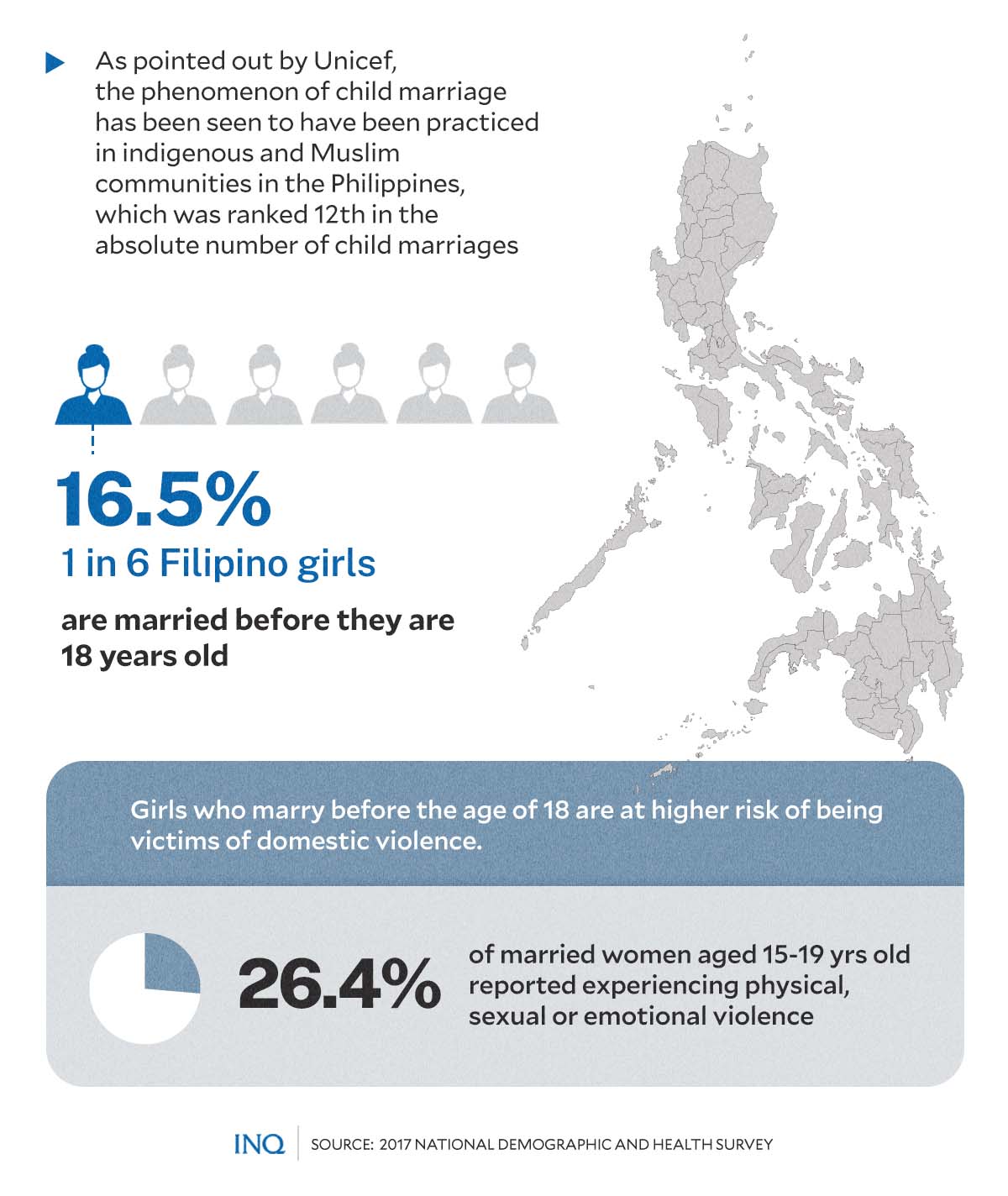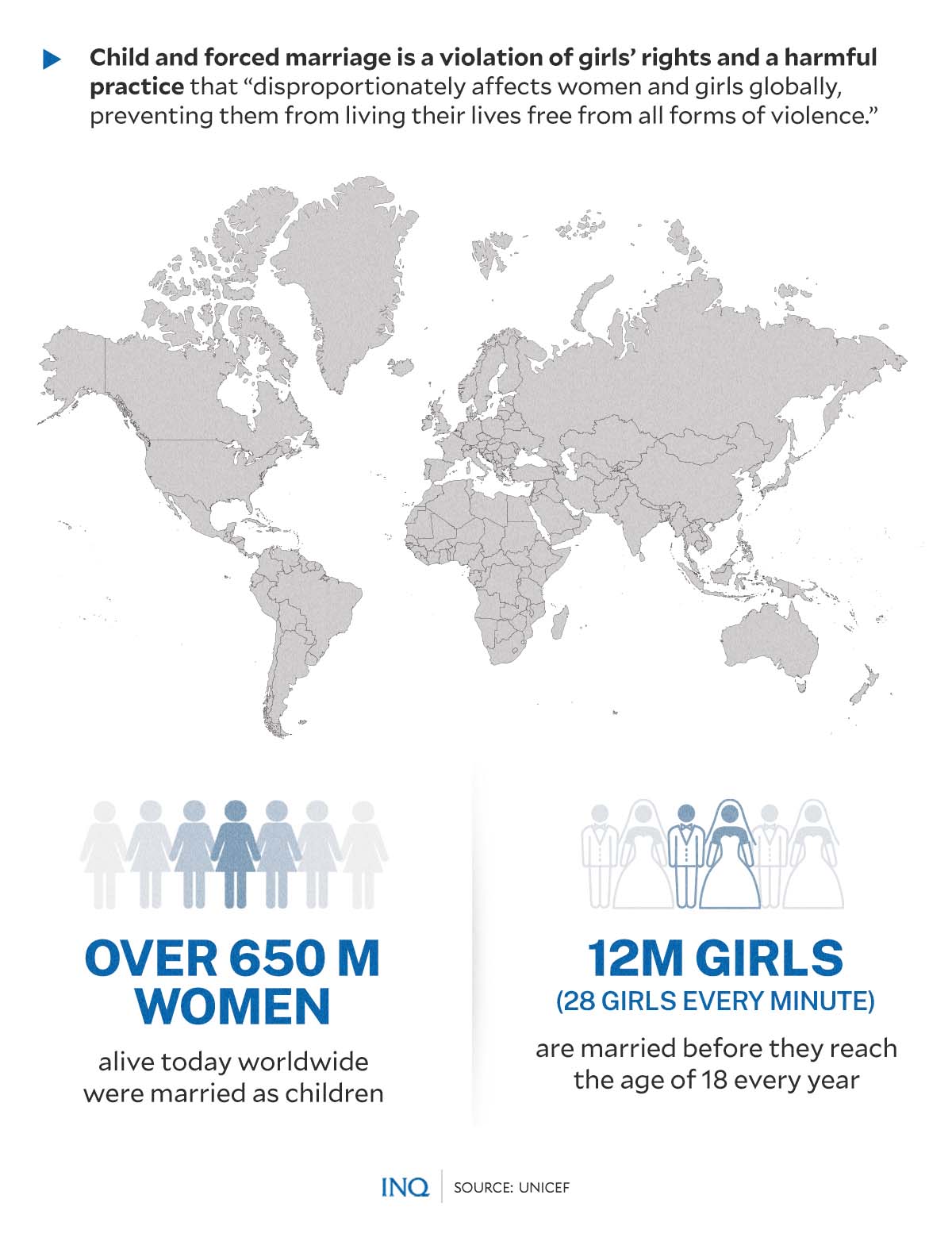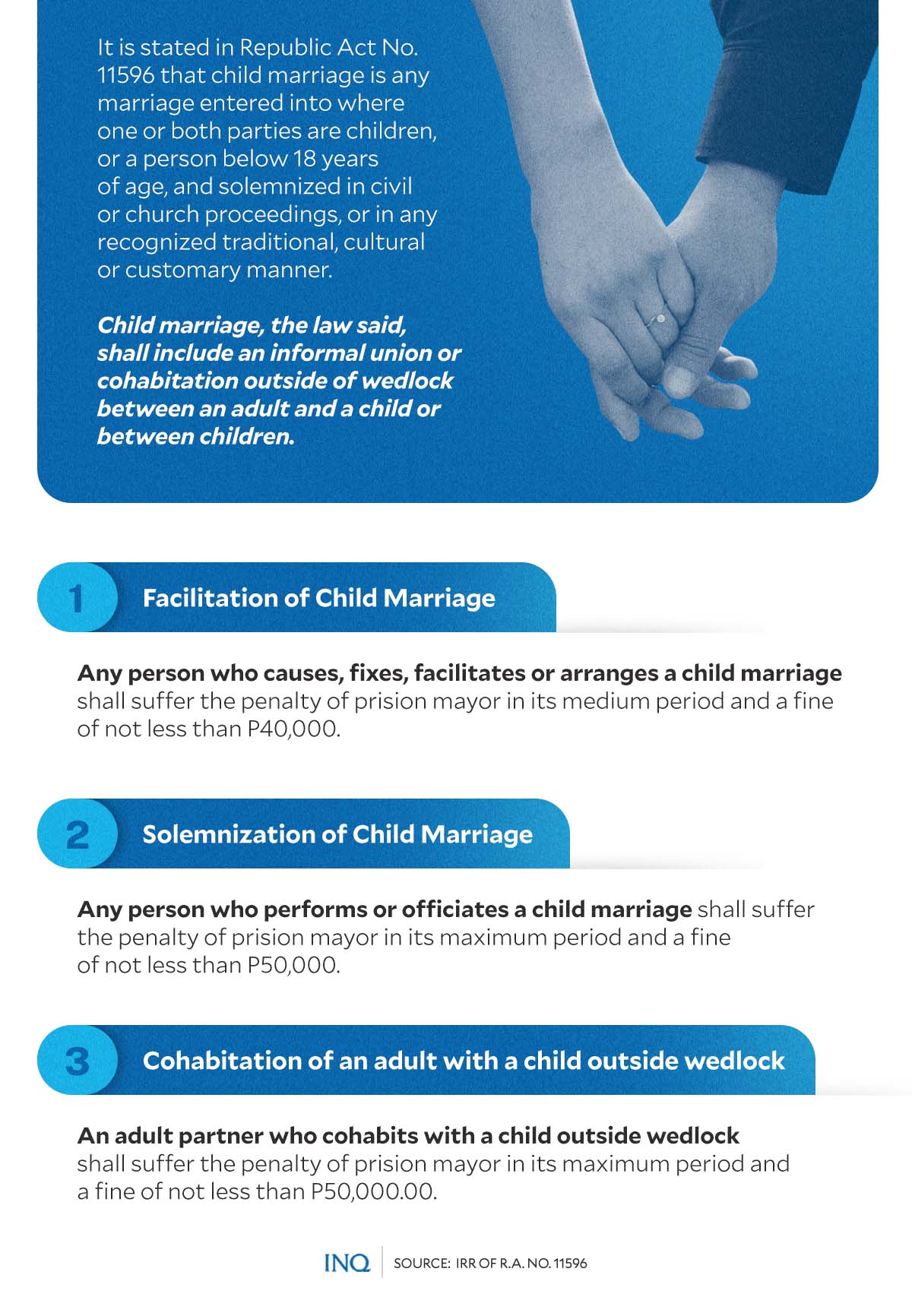Ending child marriage in PH ‘takes more than a law’
MANILA, Philippines—Child marriage harms the health and lives of young people, especially girls, which the Center for Reproductive Rights (CRR) said triggers a string of human rights violations throughout the child’s life.
The practice continues to prevail in the Philippines and elsewhere.
Hope flickered when the Philippines passed Republic Act No. 11596, which declared child marriage to be illegal and prohibited. It carried tough penalties for violators.
READ: Bill banning, criminalizing child marriage in PH lapsed into law — solon
The CRR had said it was pleased that the government has finally recognized that child marriage is a serious human rights violation harming the health and safety of girls and boys. “This new law represents a significant first step in safeguarding the rights of children in the Philippines,” it said.
Article continues after this advertisementAccording to the 2017 National Demographic and Health Survey (NDHS), one in six Filipino girls, or 16.5 percent, are married before they are 18 years old. The United Nations Children’s Fund (Unicef) said child marriage is a practice among indigenous and Muslim communities.
Article continues after this advertisementRELATED STORY: New law bans child marriage: ‘Major victory’ vs abuse of girls
Worldwide, the numbers are more disturbing with over 650 million women alive today saying they had been married as children. Unicef said yearly, 12 million girls, or 28 girls every minute, are married before they turn 18, the recognized legal age of marriage.
These numbers represent the struggle of young girls, who are prevented from living their lives free from all forms violence. The United Nations Office of the High Commissioner on Human Rights said that “child and forced marriage threatens the lives and future of girls and women around the world.”
The pervasive problem, it said, is “robbing them of their agency to make decisions about their lives, disrupting their education, making them more vulnerable to violence, discrimination and abuse, and preventing their full participation in economic, political and social schemes.”
According to the NDHS, 26.4 percent of married women in the Philippines, who are 15 to 19 years old, reported suffering physical, sexual or emotional violence from their spouse or partner. This was the reason the enactment of the Prohibition of Child Marriage Act was celebrated last year.
RELATED STORY: Gender-based challenges falter Filipino girls’ potentials, study shows
The law, Oxfam Pilipinas said, was a significant milestone in the Philippines’ fight to end violence against women and girls and child, early and forced marriage. The law, it said, “will give women and girls the power to make free and informed choices, enabling them to break free from the endless cycle of poverty, violence and inequality.”
‘Don’t waste time’
However, over a year later, the Girl Defenders Alliance, including Oxfam Pilipinas, pointed out the need to comprehensively implement the law, stressing that the implementation of provisions that institutionalize prevention programs is as equally important as the prohibition.
Rom Dongeto, executive director of the Philippine Legislators’ Committee on Population and Development (PLCPD), said the commemoration of International Day of the Girl Child should be a reminder that “ending child marriage requires challenging long-existing norms and behavior change.”
He said as the world celebrates International Day of the Girl Child, it is important to note that each day that passes without full implementation of the Prohibition of Child Marriage Act “is a lost opportunity in keeping girls safe and empowering them to reach their full potentials.”
Oxfam Pilipinas said despite the legislative breakthrough, there is a need “to strengthen government and civil society organizations’ efforts to improve understanding of the intentions of the law and its IRR (Implementing Rules and Regulations) to the public.”
“We cannot simply watch when a young girl’s chance to education and her right to make her own choices are affected,” said Erika Geronimo, Oxfam Pilipinas executive director.
“We must counter the spread of harmful norms and nurture well-informed communities that will collectively uphold the rights of every young Filipino girl,” Geronimo said.
Oxfam Pilipinas and PLCPD are carrying out a program called “Bridging the Information Gap on the Prohibition of Child Marriage Act in the Philippines and its IRR.”
This is aimed at strengthening the capacity of both the government and civil society organizations to respond to the information gap on the PCM Act and its IRR.
Breaking the norms
RA No. 11596 defines child marriage as any marriage entered into where one or both parties are children—a person below 18 years of age, and solemnized in civil or church proceedings, or in any recognized traditional, cultural or customary manner.
RELATED STORY: Marriage and culture
As Plan International pointed out, child marriages happen because of long-standing norms that cause grave harm, like denial of education, endless poverty, and greater likelihood and risks of early pregnancy, childbirth, maternal mortality, and sexual violence:
Inequalities between boys and girls driven by harmful social and gender norms
Laws protecting girls aren’t enforced
Parents think marriage will protect girls from violence, particularly in times of crisis or insecurity
Younger wives are considered to be more obedient
Poverty – plus there is a higher dowry for older girls or women
It said “if we don’t act now, more than 150 million girls will become child brides by 2030.”
As the CPR pointed out, “criminalization is just the first step, and we’re hopeful this law will bring about a host of other actions to combat the entrenched cultural biases and harmful stereotypes that have allowed child marriage to occur for so long.”
“Government’s efforts to prohibit child marriage must include measures to challenge entrenched social norms and discriminatory gender stereotypes that underlie the practice of child marriage in the country,” it said.
READ: Perspectives and realities of child marriage
This, as the United Nations Human Rights Council stressed that “the criminalization of child, early and forced marriage alone is insufficient when introduced without complementary measures and support programmes.”
Tough penalties
According to the law, facilitation, solemnization of child marriage, and cohabitation of an adult with a child outside wedlock are public crimes and their prosecution may be initiated by any concerned individual. Child marriages, the law said, will also be considered “void ab initio,” or void from the start.
The law provides that any person who causes, fixes, facilitates or arranges a child marriage shall suffer the penalty of prision mayor in its medium period and a fine of not less than P40,000.
However, should the perpetrator be an ascendant, parent, adoptive parent, step parent or guardian of the child, the penalty shall be prision mayor in its maximum period, a fine of not less than P50,000 and perpetual loss of parental authority.
Likewise, any person who produces, prints, issues and/distributes fraudulent or tampered document such as birth certificates, affidavits of delayed registration of birth and/or foundling certificates for the purpose of misrepresenting the age of a child to facilitate child marriage or evade liability shall be liable.
If the perpetrator is a public officer, he or she shall be dismissed from the service and be perpetually disqualified from holding office.
The same will be imposed on a public officer who will solemnize child marriage or cohabit with a child.
For solemnization of child marriage, the penalty of prision mayor in its maximum period and a fine of not less than P50,000 will be imposed.
The penalty of prision mayor in its maximum period and a fine of not less than P50,000, meanwhile, will be imposed on an adult partner who cohabits with a child outside wedlock.
RELATED STORY: CHR: Forced child marriages, human rights violations committed by Socorro cult
TSB



